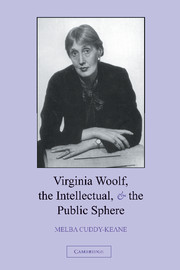Book contents
- Frontmatter
- Contents
- Acknowledgments
- List of abbreviations
- Introduction: a wider sphere
- PART ONE CULTURAL CONTEXTS
- 1 Democratic highbrow: Woolf and the classless intellectual
- 2 Woolf, English studies, and the making of the (new) common reader
- PART TWO CRITICAL PRACTICE
- Postscript: intellectual work today
- Notes
- Bibliography
- Index
1 - Democratic highbrow: Woolf and the classless intellectual
Published online by Cambridge University Press: 22 September 2009
- Frontmatter
- Contents
- Acknowledgments
- List of abbreviations
- Introduction: a wider sphere
- PART ONE CULTURAL CONTEXTS
- 1 Democratic highbrow: Woolf and the classless intellectual
- 2 Woolf, English studies, and the making of the (new) common reader
- PART TWO CRITICAL PRACTICE
- Postscript: intellectual work today
- Notes
- Bibliography
- Index
Summary
“When I use a word,” Humpty Dumpty said, in rather a scornful tone, “it means just what I choose it to mean – neither more nor less.”
“The question is,” said Alice, “whether you can make words mean so many different things.”
“The question is,” said Humpty Dumpty, “which is to be master – that's all.”
Lewis Carroll, Alice in WonderlandIt is also that the variations and confusions of meaning are not just faults in a system, or errors of feedback, or deficiencies of education. They are in many cases, in my terms, historical and contemporary substance. Indeed they have often, as variations, to be insisted upon, just because they embody different experiences and readings of experience, and this will continue to be true, in active relationships and conflicts, over and above the clarifying exercises of scholars or committees. What can really be contributed is not resolution but perhaps, at times, just that extra edge of consciousness.
Raymond Williams, KeywordsCULTURAL KEYWORDS
To write about Virginia Woolf as a democratic highbrow is to invoke controversy. My approach challenges the notion of the modernist writer as aloof from the public and the idea of intellectuals as an elite; it resists identifications of the popular exclusively with the world of commodities and entertainment; it rejects the notion that declining standards must inevitably follow from “the mass.” And, as I state in my introduction, my approach contests a number of prevailing constructions of “Virginia Woolf.
- Type
- Chapter
- Information
- Virginia Woolf, the Intellectual, and the Public Sphere , pp. 13 - 58Publisher: Cambridge University PressPrint publication year: 2003



